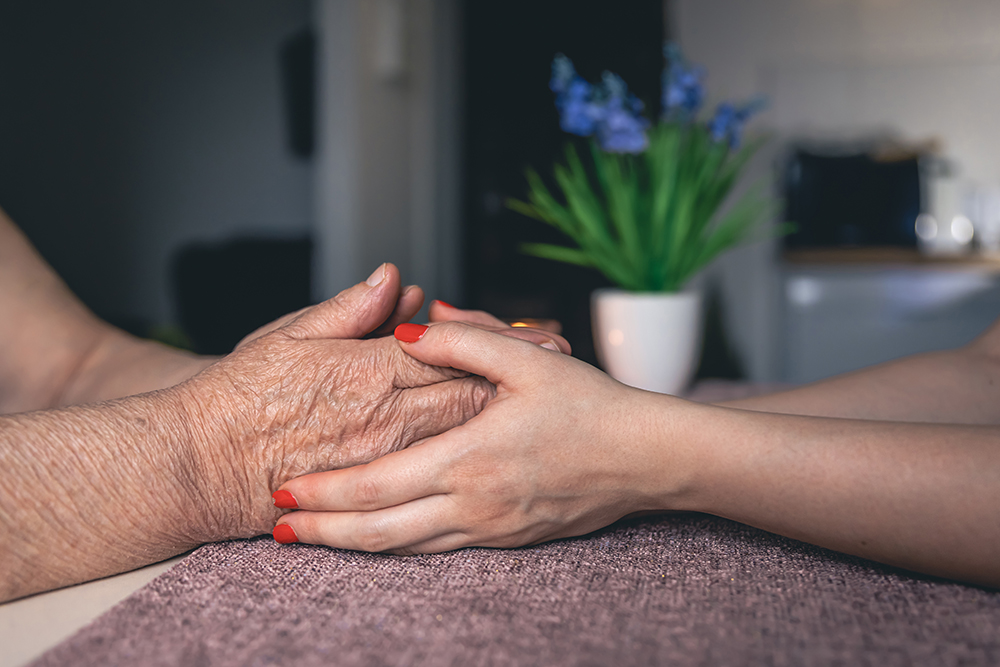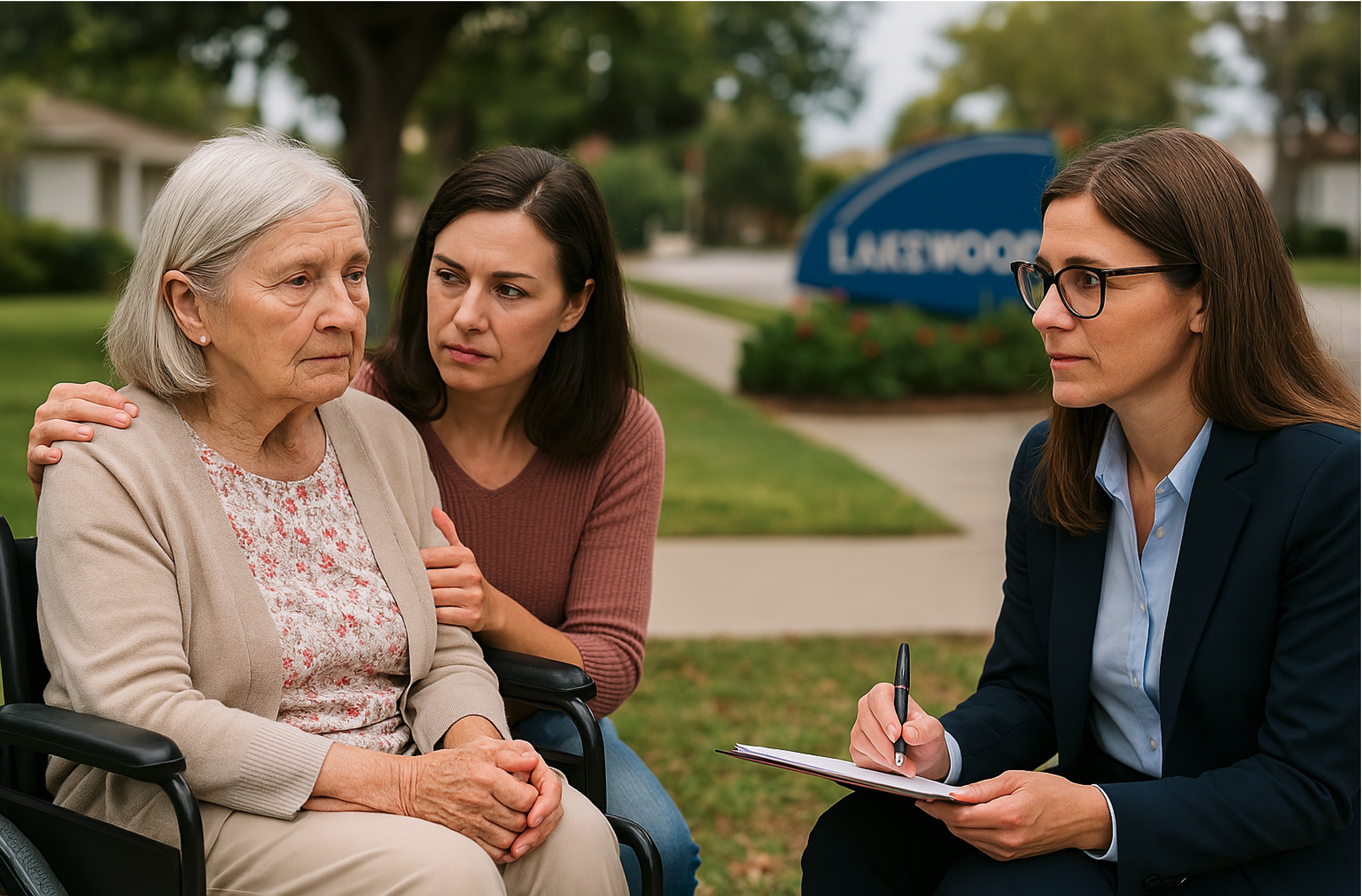Elder Abuse & Nursing Home Attorneys Lakewood


Lakewood Lawyer for Elder Abuse, Nursing Home Neglect & Assisted Living Facility Cases
Maybe This Sounds Familiar?
Your mother was always sharp, independent, and strong-willed.
Then, she moved into an assisted living facility in Lakewood after a few falls at home — just to be safe.
At first, things seemed fine. The staff were friendly. You were provided with regular updates on your mom’s condition. The facility was clean. But then you noticed disturbing changes that couldn’t be ignored.
- Your Mom seemed quieter… withdrawn.
- You noticed a faint bruise on her arm.
- Your Mom’s laundry hadn’t been done in quite a while.
- Your Mom told you she waited two hours for someone to help her to the bathroom.
When you asked the staff, they brushed it off and responded, “She’s just confused,” they said. But you knew better.
A month later, your mom ended up in the hospital — dehydrated, disoriented, and with bedsores that hadn’t been reported.
When Safety Turns into Risk in Lakewood California
Placing your loved one in a care facility is a difficult decision. You trust that the staff will treat them with excellent healthcare, respect, and compassion. But sometimes, behind well-lit lobbies and polished hallways, residents suffer in silence.
It’s hard to believe. It’s painful to imagine. But it happens more often than most people realize.
At Justice For Our Parents, we help families hold facilities accountable for abuse and neglect — because your loved one deserves more than excuses.
Understanding Elder and Dependent Adult Abuse
Under California law, “elder abuse” refers to victims age 65 or older. “Dependent adult abuse” applies to those 18–64 who live with physical or mental disabilities that require care.
Elder abuse includes:
- Physical harm (hitting, pushing, unnecessary restraints)
- Neglect (failing to provide food, water, hygiene, or medical care)
- Emotional abuse (mocking, threats, isolation)
- Sexual abuse
- Abandonment or improper supervision
- Financial or fiduciary abuse (exploitation, stolen funds, pressured signatures)
These acts can occur in nursing homes, assisted living facilities, and even in board-and-care homes. Families are often unaware until serious damage has been done.
Warning Signs of Abuse
- Unexplained bruises, fractures, or injuries
- Poor hygiene or unwashed clothing
- Sudden withdrawal or fear around staff
- Missed medications or untreated illness
- Confusion or rapid health decline
- Staff refusing to let you visit privately
If you’ve noticed any of these, you’re not alone — and you may have grounds for legal action.
📞 Concerned About a Loved One in Lakewood?
Call (562) 982-4311 now for a FREE, confidential consultation.
Why Lakewood? Why Now?
There’s NO Excuse for Elder Abuse in Lakewood, CA
Lakewood’s population of over 82,000 includes thousands of seniors living in care homes. There are more than 180 assisted living facilities licensed in the city and multiple skilled nursing facilities serving the region.
Some facilities are well-staffed and well-regarded. Others have been cited for these types of issues:
- Inadequate staffing
- Failure to follow safety protocols
- Poor patient supervision
- Infections and untreated pressure sores
Even one overlooked incident can cascade into irreversible harm to your loved one. When a Lakewood facility fails its duty — we step in.
Legal Rights Under California’s EADACPA
The Elder Abuse and Dependent Adult Civil Protection Act (EADACPA) protects both seniors and dependent adults from abuse and neglect.
You may be entitled to compensation for:
- Hospital bills and follow-up care
- Transfer to a safer facility
- Emotional suffering and trauma
- Pain and punitive damages
- Wrongful death damages
Mandated Reporting and Accountability
In California, care facility employees are mandated reporters, which means they are legally required to report suspected abuse or neglect.
When they don’t — and a resident suffers — their silence can become part of the case.
We help families determine who failed, when it happened, and how it can be proved.
Our Process — What to Expect
At Justice For Our Parents, we guide families through the legal process with both confidence and care. Here’s how we work:
- Free Consultation – We listen, evaluate, and explain your options
- Evidence Review – Medical records, photos, facility citations
- Expert Consults – Medical and elder care professionals
- Resolution -- Negotiated settlement or trial
Why Families Choose Justice For Our Parents
- We focus our practice on elder abuse and dependent adult neglect
- We’ve handled hundreds of abuse and neglect claims over 20 years
- We work on contingency — you don’t pay unless we win
- We serve Lakewood and surrounding cities across L.A. County
- Our team combines legal expertise with genuine compassion
We don’t just pursue compensation — we help families reclaim their voice and peace of mind.
Frequently Asked Questions About Elder Abuse and Neglect
Do I need proof before contacting a lawyer?
No. Many families start with gut feelings or subtle concerns. We investigate from there — and often uncover patterns or documentation that confirm your instincts.
What are the different types of elder abuse?
Elder abuse includes physical, emotional, sexual, and financial abuse. It also includes neglect and abandonment, especially when caregivers fail to provide necessary care or supervision.
What if my loved one can’t testify due to dementia or disability?
That’s very common. We use medical records, expert evaluations, and facility documentation to support cases even when the victim cannot speak for themselves.
What should I do if I suspect elder abuse?
Take immediate action. Report your concerns to local the appropriate licensing agency or Adult Protective Services. Then consult an elder abuse attorney at Justice For Our Parents to understand your legal options.
Can I sue a nursing home or assisted living facility for elder abuse?
Yes. If a facility is responsible for neglect, injury, or emotional harm, you can file a lawsuit to hold them accountable and pursue compensation.
What if the facility denies anything wrong?
It happens all the time. We often work with families whose concerns have been dismissed. Our legal team can uncover hidden issues, including falsified records or ignored complaints.
What legal protection is available in California?
California’s Elder Abuse and Dependent Adult Civil Protection Act (EADACPA) gives families the right to take legal action against facilities or individuals who cause harm to the elderly or dependent adults.
Can I still take legal action if the abuse happened months ago?
Yes. However, there are several statutes of limitations which apply, so it is better to contact us sooner than later to protect all of your potential claims.
What if the abuse happened to a dependent adult under 65?
California law protects both elders (age 65+) and dependent adults (age 18–64 with physical or mental limitations). The same legal actions can apply.
What are common signs of elder abuse?
Watch for pressure injuries, unexplained injuries, poor hygiene, weight loss, withdrawal, depression, sudden financial changes, or fearfulness around caregivers.
How does an elder abuse attorney help?
We investigate the situation, collect evidence, work with experts, file legal claims, and fight for justice in or out of court — while supporting your family through every step.
What compensation can I receive from a lawsuit?
You may receive financial compensation for medical costs, emotional trauma, pain, and suffering, and — in some cases — punitive damages to hold abusers accountable.
You Don’t Have to Do This Alone
If you’re worried about a loved one in a Lakewood facility, you don’t need all the answers today.
You just need to take the first step.
Call Justice For Our Parents at Call (562) 982-4311 or contact us online.
We’ll help you understand what’s happened, explore your rights, and guide you on the best course of action to move forward.
Because protecting your parent shouldn’t require a fight —But if it does, we’ll be there beside you.

